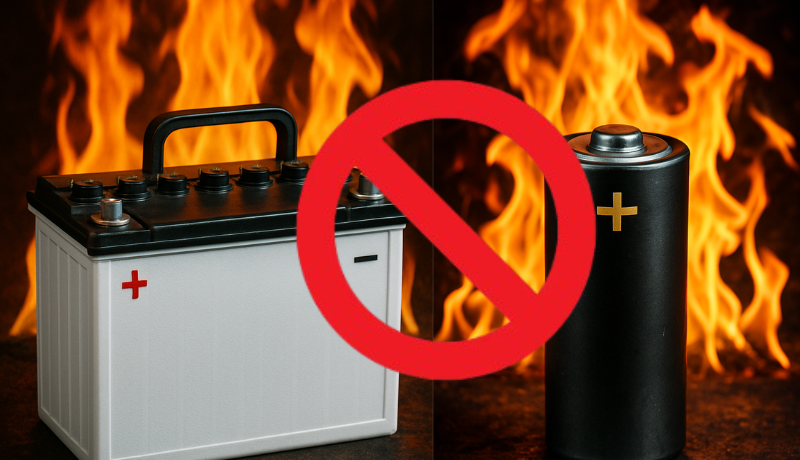

Battery Fires and Lithium-Ion: Challenges and Solutions
CYRUS INDIA SECURITIES
Battery Fires and Lithium-Ion: Challenges and Solutions
Lithium-ion batteries have become the backbone of modern electronics — powering everything from smartphones and laptops to electric vehicles (EVs) and industrial equipment. However, with their widespread use comes a growing concern: battery fires.
In this blog, we’ll dive deep into why lithium-ion battery fires occur, the risks involved, and practical solutions to minimize these incidents — including fire safety measures promoted by Cyrus India Securities, a leader in integrated safety and surveillance systems.
Why Do Lithium-Ion Batteries Catch Fire?
Lithium-ion batteries are generally safe, but under certain conditions, they can become a fire hazard. Common causes of battery fires include:
Thermal runaway: A chain reaction that results in rapidly rising temperatures.
- Overcharging or deep discharging.
- Physical damage (punctures, crushing).
- short-circuits due to poor design or manufacturing defects.
- Improper storage or exposure to high heat.
- Once ignited, these fires are difficult to extinguish and can release toxic gases.
Real-World Examples of Lithium-Ion Fires
- EV fires reported in India and globally have raised alarms over battery quality and management systems.
- Several smartphone explosions have led to product recalls in the past.
- Warehouse and facility fires caused by large battery banks highlight the need for preventive systems.
Safety Challenges Faced by Businesses and Consumers
- Lack of early detection systems.
- Insufficient knowledge of handling battery fires.
- Inadequate storage practices, especially in hot climates.
- No compliance with BIS or international battery safety standards.
This is where Cyrus India Securities plays a critical role.
- Cyrus India Securities: Enabling Safer Battery Infrastructure
- Cyrus India Securities, a trusted name in security and fire safety solutions, offers advanced systems tailored for battery-powered environments.
Their commitment to innovation and reliability helps clients ensure that lithium-ion batteries are stored and used safely — minimizing fire risks.
How to Reduce Lithium-Ion Battery Fire Risks
Whether you’re an individual or a business, here are key safety practices:
1. Use Certified Batteries
Only use batteries that meet BIS, UL, or IEC standards. Avoid cheap, non-branded alternatives.
2. Don’t Overcharge
Use chargers with cutoff features and never leave devices charging overnight.
3. Regular Inspection
In industries, conduct routine thermal scanning and battery health checks.
4. Install Safety Systems
Partner with experts like Cyrus India Securities to install:
Fire detection and suppression systems
The Future: Smarter, Safer Battery Tech:-
With the rise of Electric Vehicles (EVs), solar storage, and IoT, lithium-ion batteries aren’t going anywhere. What we need is:
- Smart Battery Management Systems (BMS)
- Solid-state batteries with lower fire risk
- Government regulations and mandatory fire compliance
- More awareness campaigns on battery fire safety
Conclusion
Lithium-ion battery fires are a growing but manageable threat. Through the right combination of technology, awareness, and security infrastructure, we can prevent tragedies before they happen.
For more info:-
Visit us at - Cyrusindia.com
Contact - 0522-4026916
Email- [email protected]
Reference:
Multiple sources
